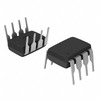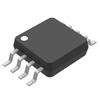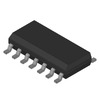Manufacturer Part Number
KA2901DTF
Manufacturer
onsemi
Introduction
The KA2901DTF is a general purpose linear comparator from onsemi, featuring four elements with multiple output types and broad voltage supply range, designed for various applications but now declared as obsolete.
Product Features and Performance
Four comparator elements
Output Type includes DTL, MOS, Open-Collector, TTL
Supports a wide range of supply voltages from 2V up to 36V or ±1V up to ±18V
Can handle maximum input offset voltage of 7mV at 5V
Low input bias current maximum of 0.25µA at 5V
Typical output current of 18mA at 5V
Maximum quiescent current of 2.5mA
Operating temperature range from -40°C to 85°C
Provides versatility in various output configurations
Product Advantages
Multiple output types compatibility enhances flexibility in usage
Low power consumption with maximum quiescent current of 2.5mA
Able to work under a wide range of environmental temperatures
Key Technical Parameters
Voltage - Supply, Single/Dual (±): 2V ~ 36V, ±1V ~ 18V
Voltage - Input Offset (Max): 7mV @ 5V
Current - Input Bias (Max): 0.25µA @ 5V
Current - Output (Typ): 18mA @ 5V
Current - Quiescent (Max): 2.5mA
Operating Temperature: -40°C ~ 85°C
Quality and Safety Features
Reliable operation within specified temperature range of -40°C to 85°C
Compatibility
Outputs compatible with DTL, MOS, Open-Collector, and TTL logic families
Application Areas
Used in various applications requiring voltage comparison and operational consistency under varying temperatures
Product Lifecycle
Status: Obsolete
Note: Customers should identify replacements or upgrades as this model is no longer in production
Several Key Reasons to Choose This Product
Versatile output type options (DTL, MOS, Open-Collector, TTL) compatible with various logic families
Supports a wide range of supply voltages from 2V to 36V, and ±1V to ±18V dual supply
Low input bias and quiescent currents promote energy efficiency
Able to operate efficiently across a wide temperature spectrum
Optimal choice for designs requiring robust performance in temperature-variable environments




 KA2902NKA
KA2902NKA KA2807MUXonsemiPKG DERIVATIVES
KA2807MUXonsemiPKG DERIVATIVES KA2901DMTFFairchild SemiconductorIC COMPARATOR 4 GEN PUR 14SOP
KA2901DMTFFairchild SemiconductorIC COMPARATOR 4 GEN PUR 14SOP KA2901Fairchild SemiconductorIC COMPARATOR 4 GEN PUR 14DIP
KA2901Fairchild SemiconductorIC COMPARATOR 4 GEN PUR 14DIP